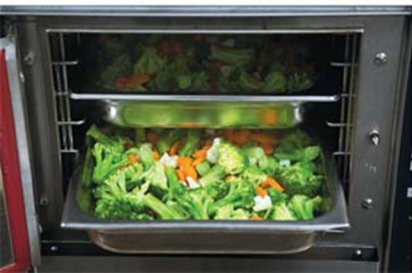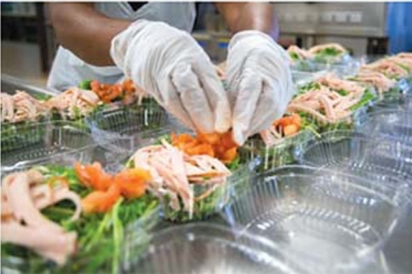Detroit Schools Ditch Fryers, Embrace Fresh
It's a typical Thursday morning, and Detroit Public Schools’ Office of School Nutrition Executive Chef Kevin Frank is chopping carrots and celery for a school catering event, directing staff on lunch prep and coordinating with vendors to place orders and schedule deliveries. All the while, he’s thinking ahead to what he’ll serve on next month’s menu.
The goal of all this juggling is to make sure the food on the plates of students in the Detroit Public Schools is as fresh, healthy and local as possible.
After graduating from the Schoolcraft College Culinary Arts Program, Frank began his career working in restaurants. After a few years, he took a job as a food service coordinator at a charter school in southwest Detroit to be nearer to his family. Then, in 2012, the DPS Office of School Nutrition assumed oversight for city’s summer meal program when the city health department was dismantled. Frank attended a DPS summer meal training session, where he met Office of Nutrition Executive Director Betti Wiggins.
Wiggins is a woman on a mission. Since joining DPS in 2008, she’s brought food service back in-house (it had been contracted to an outside vendor), doubling the district’s spending on actual food. She shut off the deep fryers, increased the quantity of fruits and vegetables on the menu and launched a Detroit School Garden Collaborative program. The collaborative now includes 76 school gardens across the district.
Impressed with Frank’s drive and skill, Wiggins encouraged him to apply for the executive chef position. He got the job. Frank is responsible for menu development for all DPS schools and 35 additional charter schools, Educational Achievement Authority schools and Catholic schools around the city, as well as schools in Ypsilanti, Southfield and Pontiac. It’s a growing operation; as word gets out about the quality of DPS’ program, more and more charter and private schools are contracting with DPS for food service. Frank also oversees employee training, coordinates special event catering programs and works closely with vendors to ensure every item meets nutrition and quality standards.
“It’s a lot when you are trying to do it all at the same time,” Frank says with a smile. This year, he’s most proud of his chicken Parmesan, which has turned into a blockbuster among DPS kids. Crafting menu items that meet nutrition standards and taste good to kids is challenging, Frank says, because DPS, like many school districts, is a heat-and-serve operation. That means food must be prepared in advance and warmed up onsite in school cafeterias. It’s a lot of trial and error. Frank often tests a new menu item in one school before rolling it out district-wide. He hit it right with the chicken Parmesan but struck out with an attempt to serve vegetarian falafel. So experimentation is key.
“We have to get a majority of kids on board with a new food item,” he says. “Which isn’t always easy.” Frank is always on the hunt for “clean-label” products from vendors: items without added sugar, corn syrup, fillers, artificial flavors and additives. Often, what he’s looking for isn’t available or is too expensive.
"The challenge is finding vendors who sell clean-label, whole foods at prices DPS can afford,” he says. “It’s cheaper for them to sell foods with fillers and artificial ingredients because it stretches the product, and they can sell more for less.”
Frank would like to see DPS adopt an entirely clean-label menu in the future, and he’d like to see more schools build the capacity to move away from heat-and-serve and towards cooking from scratch with whole foods. The main obstacle, he says, is making the initial investment in DPS’ school kitchens so that they have the right equipment and training to cook from scratch.
“In the long-term, it will reduce our overall food cost, but first we have to make that initial investment.”
And that’s a challenge for a cash-strapped district like DPS. As a federally designated “Community Eligibility District,” DPS’ program is entirely funded through a $3.06-per-meal allocation from the USDA.
One way DPS is working to improve the quality of its food supply is through a partnership with Ann Arbor–based Local Orbit, a technology company that provides supply chain management services and tools to accelerate local procurement for institutional food-service buyers.
“Local Orbit is helping the DPS Office of School Nutrition gather and analyze their data about procurement in ways they haven’t been able to before,” says CEO Erika Block. “We’re making it easier to increase what they purchase from local suppliers.” Block says part of the problem is the food system itself, which makes it cheaper and more convenient for institutions to buy processed foods. “Consumer demand and the supply chain are changing, but finding a match between the amount of product DPS needs at the right price is a challenge because the [local food] system is still nascent,” she says.
DPS is also working to increase its capacity for clean-label, whole food procurement and in-house processing through the Midwest Regional Learning Lab, a coalition of seven large school districts across the Midwest working to leverage their combined buying power to reduce costs. And a grant from the Lifetime Fitness Foundation will allow Frank and Wiggins to establish an in-house small-scale processing kitchen to maximize the value of produce from the school gardens and urban farms.
“We’re letting the vendors know that there is a real desire for clean-label, healthy foods out there,” says Frank, “and they need to be paying attention to that.”











